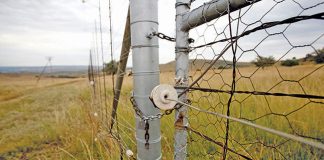
Photo: FW Archive
There will probably never be a time when pork producers will be able to completely eliminate the use of antibiotics, but they are urged to stop using growth promoters and reduce the use of antibiotics.
This was according to Dr Peter Evans, head of consumer assurance at the South African Pork Producers’ Organisation (SAPPO).
READ: Animal welfare: Raising stress-free pigs
“It’s a reality that any disease spreads faster when you have bodies close to each other,” Evans said at a recent media briefing.
“Bacteria and viruses are finding ways of surviving and therefore we will always have disease,” he added.
SAPPO would, however, like the industry to reach a point where it could get rid of growth promoters, Evans said.
“Farmers need to treat diseases when their animals [contract] them, but don’t use [antibiotics] to enhance production. It is possible for antibiotics to be used strategically and to a lesser extent.”
While there was a possibility that certain “critical” antibiotics that were being used in pigs as well as humans could be banned for use in pigs in future, he said “to ban all antibiotics [would] be unproductive”.
READ Technology and animal welfare improve piggery profits
Evans added that the health of South Africa’s national pig herd remained in an enviable position when compared with the global industry, despite the challenges that came with the outbreak of African swine fever (ASF).
Johann Kotzé, CEO of SAPPO, said ASF remained the biggest concern within the industry as far as diseases were concerned.
“The biggest spreader of ASF is poverty. If we’re able to get rid of poverty, we’ll be able to get rid of the problem.”
Kotzé explained that poverty was an issue, because many South Africans were poor and desperate.
“When [visiting] farms where ASF had to be eradicated, there were [often] people living in many of the pig pens.”
Kotzé added that this interaction between humans and pigs resulted in the disease spreading faster and further than it would have if proper biosecurity measures were followed.
“In the end, we need to create a new economy [in South Africa] where people are in a less desperate state,” said Kotzé.
Dr Thandi Chiappero, SAPPO veterinarian and head of the One Health Consumer Assurance programme, said the association was hard at work to ensure optimal health for people, animals and the environment.
“Through our Pork 360 programme, we are already monitoring antimicrobial residues, heavy metals in water, and [the] evidence of zoonotic disease.
“Moving forward, we are looking into the [co-ordination] of information about antimicrobial resistance from laboratories, and increasing the assessment of farming’s impact on environmental health. We also want to help farmers prepare contingency plans for high impact diseases such as ASF.”











